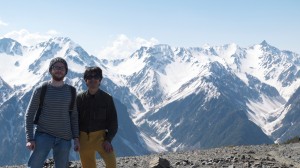Oskar Hartbrich is a PhD student who specialises in developing state-of-the art calorimeters for future ILC detectors. He is also a specialist for full detectors simulations, and he has just spent nine weeks in Japan getting even deeper into this role, sitting side by side with other experts from Tokyo and Shinshu universities to further improve the machine-detector interface relative to the proposed ILC site in the Kitakami hills.
Hartbrich’s trip to Japan was pioneering work – not so much for the work itself, which has been going on for a while, but for the administrative structure that helped him get to and settle in Japan. A new EU-funded project called E-JADE will make exchanges like this one easier and more common in the future.
E-JADE stands for Europe-Japan Accelerator Development Exchange programme and is coordinated by CERN. Partner institutions in Japan are KEK and the University of Tokyo; in Europe, the Universities of Oxford and Royal Holloway (UK), CNRS and CEA (F), IFIC (ES) and DESY (DE) are participating in the project. The European Commission supports it with 1.6 million Euros over 4 years, supporting secondments of researchers from Europe to Japan. Japanese researchers will also spend at CERN and other labs, albeit without being financed by the European Commission.
“E-JADE is all about people and knowledge exchange between European and Japanese institutions for future accelerators for particle physics,” says Steinar Stapnes from CERN, the coordinator of the project. “The roadmaps of both regions are very similar and E-JADE is a great opportunity to make sure that the strategies become even more streamlined by making it easier for people to talk to each other.” The projects on the European roadmap are the LHC and its upgrades, R&D for the new-energy frontier accelerators at CERN – FCC and CLIC –, European participation in a Japan-hosted ILC and a European neutrino programme that focuses on European participation in US- and Japan-based long-baseline projects. Japan’s roadmap highlights J-PARC, the ILC and the Japanese participation in LHC upgrades as well as generic accelerator R&D.
The projects on these roadmaps are all international already. Many researchers from Japan are involved in the LHC, many researchers from Europe work on J-PARC experiments, Belle-II and the Accelerator Test facility ATF, and both communities provide experts on R&D projects for future accelerators that will be global from the start. E-JADE will not only boost technical progress in all of these projects, but is also meant as a platform for more worldly exchange: the way projects are organised and the way things are purchased in the different regions play an important role, as does the way industry works. Already in place are a KEK office at CERN and a CERN office at KEK. “The researchers will be integrated in the appropriate technical groups they are visiting,” stresses Stapnes.
Hartbrich thoroughly enjoyed his time in Japan. While improving the full modelling of the ILD detector according to site-specific requirements and based on test beam data – it now boasts the greatest possible precision –, he got to know two very different faces of Japan. “Tokyo did not give me much of a culture shock, but it is very dense and very special. The video game culture that is celebrated in Akihabara electric city is unique,” he says. “I therefore really enjoyed spending time at Shinshu university, which is in the “Japanese Alps” known for the Nagano Winter Olympic Games. My Japanese colleagues took me hiking and skiing, and the landscape was amazingly beautiful.” What struck him most was the Japanese readiness and desire to help wherever they can.
The new ILD simulation model that emerged from the E-JADE exchange is now ready to be used. One of the next steps is to see what happens when channels fail and how to mitigate the problem, another is to combine the ILD engineering model and the physics model in order to be able to quickly adapt the simulations if the design of the detector changes because of, say, earthquake-safety requirements.


Recent Comments